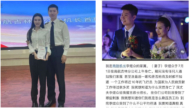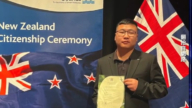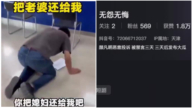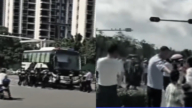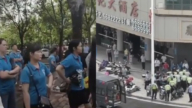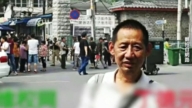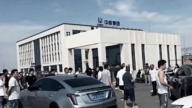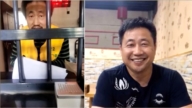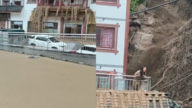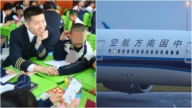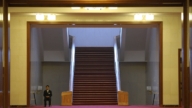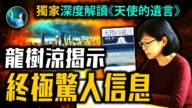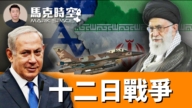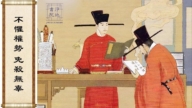【新唐人2013年01月11日讯】因新年献辞被撤换,与中共当局发生抗争的《南方周末》,周四正常出版。但由此引发的一场全国性捍卫新闻自由的声援运动,却没有随着当局的妥协而落幕。遭到公众强烈抗议的广东省宣传部部长庹震是否被撤换,还没有消息确认。
1月10号,《南方周末》报出现在北京和上海的报摊。之前,因《南方周末》新年特刊被广东省宣传部部长庹震强行删改,发生了编辑和记者的罢工抗议事件,并引发中国社会各界名人、学者及大陆网民的声援行动。
10号早上,戒备森严的南方报业门外没有再出现抗议者。三天来,数百上千的声援者聚集在南方报业门外,他们举牌、喊口号,要求结束新闻和网路管制,要求言论自由、开放报禁等。
北京时政观察人士华颇分析,庹震作的事情,只是中共整顿媒体的一部分。
北京时政观察人士华颇:“中共又不想把这个事情搞大,因为如果搞大,严厉镇压的话,就把习、李改革者的形象荡然无存,而且习、李接班,也会因为在这件事情上出现大的动荡。所以对待南周事件,中共没有让自己的第一大报《人民日报》发评论,而是让它手下的子报《环球时报》发了一篇评论。”
中共喉舌《人民日报》旗下的《环球时报》就“南周事件”,刊发社评,暗指《南周》采编人员的抗争是在境外势力的策动下,挑战体制。
中宣部下令全中国各主流网站及各地有影响力的报纸,转载《环时》的社论。但是,《南方都市报》、《新京报》、《潇湘晨报》等抗命不予转载。
8号晚,中宣部点名,强令《新京报》、《潇湘晨报》9号必须刊登,但遭《新京报》采编人员的集体抵制,社长戴自更,口头请辞抗命。据说,北京市委宣传部副部长严力强威胁说,不发文,就解散报社。
9号,《新京报》在中国新闻版A20版最右下,刊载了《环球时报》社评中的一段中性评论。
当天上午,《路透社》说,广东新省委书记胡春华介入处理,并与《南方周末》编辑达成协议,现任主编黄灿辞职,不对罢工抗议的记者“秋后算账”,对内容的审查还恢复到之前状态。
广州律师 唐荆陵:“这个事情可能还不能算一个好的结果,因为我知道,在声援南周的人中,有一些人提出来的直接诉求是希望庹震离职,要撤掉庹震的职位,但是,如果只是撤社长,然后没有所谓的涉及审查,这个恐怕还是很多人的目的还是没有达到。”
华颇指出,中宣部强令让各大媒体转载《环球》社论,让其他媒体有一种“奴下奴”的感觉,导致媒体人被压抑已久的怒火爆发。
《新京报》事件发生后,使得“南周事件”再度激化,成了微博上的焦点。香港《苹果日报》说,这场抗议行动,已由广州、北京、上海,蔓延到成都、郑州、长沙、杭州等城市,12号、13号将有更多网民上街,渐成燎原之势。
10号上午,山东维权人士杨明玉告诉《新唐人》,他正在赶往南方报业,和几个朋友约好继续去声援南周。
山东维权人士 杨明玉:“声援南周就是声援我们自己,我们要放开我们的言论,没有言论自由是不行的,在这个独裁暴政之下,有了言论自由才有我们的下一波,推动我们的人权,保护自己。”
唐荆陵指出,社会各界都有过被侵犯言论自由的遭遇,声援南周只是一个引爆点。
唐荆陵:“起先当局封了很多人的微博,很多人的IP,不让上网,断线,断电话,没有人去关切,但是,不代表这些人自己的权力被侵犯,就没有想法,好像我们长期被中共当局封锁这个方面的信息,封锁各方面发言权的机会,都是会有感受的,不单单是针对南周的事。”
华颇预测,“南周事件”会平淡收场,庹震不久可能调离广东,高升中宣部。以后,中共对媒体的管控还会加强。
采访编辑/李韵 后制/王明宇
Southern Weekly Newspaper Incident: Will Tuo Zheng Keep his Job?
The “Southern Weekly", which began protesting
after the Chinese Communist Party (CCP)
propaganda controls altered its New Year’s
message, will resume publication on Thursday.
However, nationwide protests to defend freedom of press,
that were triggered by this incident, have not yet ended.
This is even after a successful
negotiation with the authorities.
News has not yet confirmed the replacement
of Tuo Zheng, the Propaganda Minister.
On January 10, Southern Weekly newspapers
re-appeared on news stands in Beijing and Shanghai.
Prior to that, the Southern Weekly’s editorial
team, and it’s reporters, had been on strike.
They were protesting against their New Year’s special
edition being tampered with by Tuo Zheng, the
Guangdong Province Propaganda Department Minister.
That protest trigged nation-wide support from
celebrities, scholars, and Mainland netizens.
On the morning of the Janurary 10, there were no protesters
outside the heavily guarded Southern Weekly agency.
For the last three days, hundreds of thousands of people
had gathered there, holding placards, shouting slogans,
and demanding an end to media and internet control.
They called for freedom of speech and abolishing
the ban on the Southern Weekly newspaper ban.
Hua Po, a current affairs observer in Beijing,
believes that the Tuo Zheng incident is only
a part of CCP facing rectifying the media.
Hua Po: “The CCP does not want
this incident to become too large.
Otherwise it will have to harshly crackdown
on it, which will distort the image of the
Xi-Li’s leadership as being ‘reformers’.
It will also bring huge turmoil to the current Party leadership.
That was why its first major newspaper, “People’s Daily”,
did not make a comment, but the subsidiary paper
“Global Times” published a negative commentary.
The Global Times published an editorial
regarding the “Southern Weekly incident”.
It alluded that the “Southern Weekly’s" editorial
staff protests were instigated by foreign forces,
with the purpose of challenge the system.
The Central Propaganda Department ordered
mainstream websites and all the influential
newspapers across the country to carry
this false editorial from the Global Times.
However, the “Southern City News “, “Beijing News",
and “Xiaoxiang Morning" refused to comply.
On the evening of January 8, the Central Propaganda
Department forced “Beijing News" and “Xiaoxiang Morning"
to carry the editorial in it’s January 9 publication.
The entire editorial staff of the
“Beijing News" strongly resisted.
The director Dai Zigen gave his
verbal resignation on the spot.
It was learned that Yan Lijiang, Deputy Minister of
the Beijing Municipal Party Committee Propaganda
Department, threatened to dissolve the news agency.
On January 9, “the Beijing News’ carried
a portion of the Global Times editorial
on its China News Edition A20 page.
On the morning of January 9, Reuters reported Guangdong
provincial party secretary Hu Chunhua intervened.
Hu reached an agreement with Southern
Weekly newspapers editorial department.
Huang Can, the current editor in chief, will resign, and there
will be no reprisal against staff participating in the protests.
The content review procedures
remain the same as before.
Tang Jingling, Guangzhou lawyer:
“This outcome may not be good.
Many of those among the supporters
requested the resignation of Tuo Zheng.
With the resignation of the newspapers chief editor,
but without any change in the content review system,
many peoples wishes have gone unfulfilled.”
Hua Po says that the Central Propaganda Department
ordered other major media to carry the Global Times’
editorial, and made them feel like second class slaves.
It led to the outpouring of the media’s pent-up anger.
After the “Beijing News" incident, the
“Southern Weekly” incident intensified.
It became the focus of microbloggers.
Hong Kong’s Apple Daily said protests spread
from Guangzhou, Beijing and Shanghai, through
to Chengdu, Zhengzhou, Changsha, Hangzhou,
and other cities, like a wild forest fire.
More Internet users will take to
the streets on January 12 and 13.
Shandong human rights activist Yang Mingyu told
NTD Television about the morning of January 10.
Yang rushed to the Southern Weekly with
a few friends, to support the news agency.
Yang Mingyu: “Supporting Southern
Weekly is in turn supporting ourselves.
We need freedom of speech.
Without freedom of speech, and under this
tyranny, we cannot move on to the next step.
Promoting human rights is protecting us.”
Tang Jingling highlights that violation
of freedoms of expression are encountered
in different parts of our society.
Supporting Southern Weekly is only a tipping point.
“At first, authorities closed many people’s microblogs,
took their IP address, cut cable lines, and cut phone lines.
No one seemed to show any care.
However, it does not mean that we have
no feelings about our rights being violated,
nor that we don’t know how to deal with it.
We are moved every time that we
are deprived of our opportunities.
The CCP has blocked our rights to
information for so long, and we dislike it.
This is not only about the Southern Weekly incident.”
Hua Po speculates that the Southern
Weekly incident will end quietly.
Tuo Zheng will soon be transferred
from Guangdong with a promotion.
The CCP will further strengthen its
media control in the near future.


